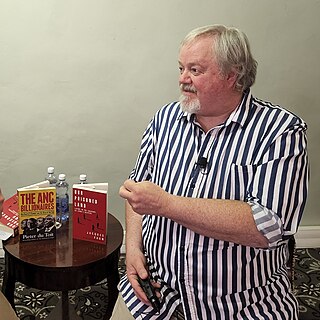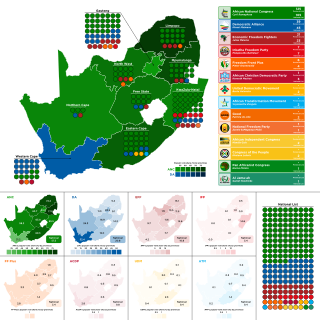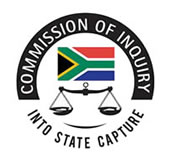The National Intelligence Agency (NIA) was the previous name of an intelligence agency of the South African government. Currently it is known as the Domestic Branch of the State Security Agency. It is responsible for domestic and counter-intelligence within the Republic of South Africa. The branch is run by a Director, who reports to the Director-General of the State Security Agency. The Director is also a member of the National Intelligence Co-Ordinating Committee (NICOC).

Nkosazana Clarice Dlamini-Zuma, sometimes referred to by her initials NDZ, is a South African politician, medical doctor and former anti-apartheid activist. A longstanding member of the African National Congress (ANC), she currently serves as Chancellor of the University of Limpopo.
The National Treasury is one of the departments of the South African government. The Treasury manages national economic policy, prepares the South African government's annual budget and manages the government's finances. Along with the South African Revenue Service and Statistics South Africa, the Treasury falls within the portfolio of the Minister of Finance. Throughout the course of President Jacob Zuma's second administration, the ministry has undergone several changes. Most notably, Nhlanhla Nene was suddenly dismissed on 9 December 2015, without explanation, and replaced with a relatively unknown parliamentary back-bencher from the ruling ANC's caucus, David 'Des' van Rooyen for a record-total of 3 days. He was, in turn, replaced by Pravin Gordhan after the President faced significant pressure from political and business groups over the move. On 30 March 2017 Jacob Zuma axed Pravin Gordhan and appointed Malusi Gigaba as a Finance Minister. Following Zuma's resignation, President Cyril Ramaphosa returned Nhlanhla Nene as Minister in his cabinet reshuffle on 26 February 2018.
The South African Revenue Service (SARS) is the revenue service of the South African government. It administers the country's tax system and customs service, and enforces compliance with related legislation. It is governed by the SARS Act 34 of 1997, which established it as "an organ of state within the public administration, but as an institution outside the public service." It thus has a significant degree of administrative autonomy, although it is under the policy control of the Minister of Finance. Effectively, SARS manages, administers, and implements the tax regime as designed by the Minister and National Treasury.

Jacques Pauw is a South African investigative journalist who was an executive producer of the Special Assignment current affairs programme on SABC. Pauw was a founding member and assistant editor of the anti-apartheid Afrikaans newspaper Vrye Weekblad. He began his television career in 1994, specializing in documentaries around the African continent.

Corruption in South Africa includes the improper use of public resources for private ends, including bribery and improper favouritism. Corruption was at its highest during the period of state capture under the presidency of Jacob Zuma and has remained widespread, negatively "affecting criminal justice, service provision, economic opportunity, social cohesion and political integrity" in South Africa.

Julius Sello Malema is a South African politician. He is the founder and leader of the Economic Freedom Fighters (EFF), a populist far-left political party known for the red berets and military-style outfits worn by its members. Before foundation of EFF, he served as president of the African National Congress Youth League (ANCYL) from 2008 until his expulsion from the party in 2012.

Tina Monica Joemat-Pettersson was a South African politician who served as the Chairperson of the Portfolio Committee on Police from July 2019 until her death in June 2023. A member of the African National Congress, Joemat-Petterson had previously served as the Minister of Agriculture, Forestry and Fisheries from 2009 until 2014 and as the Minister of Energy from May 2014 until March 2017 under President Jacob Zuma.
AfriForum is a South African non-governmental organisation which mainly focuses on the interests of Afrikaners, a subgroup of the country's white population. AfriForum has been described as a "white nationalist, alt-right, and Afrikaner nationalist group", though this description is rejected by the organisation's leadership, who refer to themselves as a civil rights group.

Athol Williams is a South African poet, applied philosopher and public intellectual based at Oxford University.

The Directorate for Priority Crime Investigation (DPCI), commonly known as the Hawks, is the branch of the South African Police Service which investigates organised crime, economic crime, corruption, and other serious crime referred to it by the President or another division of the police. The unit was established in 2008 by President Jacob Zuma to replace the disbanded Scorpions.
Duduzile "Dudu" Cynthia Myeni was a South African businesswoman, a chairperson of South African Airways SOC Limited, and executive chairperson of the Jacob Zuma Foundation since September 2008.
The Gupta family is a wealthy and influential business family from India, with close ties to former South African President Jacob Zuma and his administration. The family's most notable members are the brothers Ajay, Atul, and Rajesh "Tony" Gupta—as well as Atul's nephews Varun, and US-based Ashish and Amol.

General elections were held in South Africa on 8 May 2019 to elect a new President, National Assembly and provincial legislatures in each province. These were the sixth elections held since the end of apartheid in 1994 and determined who would become the next President of South Africa.
Thomas Moyane is a South African development economist and former commissioner of the South African Revenue Service (SARS).
Shaun Abrahams is a South African lawyer and the former national director of public prosecutions (NDPP) at the National Prosecuting Authority.
Arthur Fraser is a South African civil servant and former intelligence operative who was head of the State Security Agency from 2016 to 2018 and National Commissioner for Correctional Services from 2018 to 2021. He was previously an anti-apartheid activist in the African National Congress, a senior official in the now-defunct National Intelligence Agency, and briefly a senior official in the Department of Home Affairs.
Bosasa was a South African company specialising in providing services to government, most notably correctional services. It consisted of Bosasa Group, Bosasa Youth Development Centres, and African Global Operations. The company was liquidated in 2019 after whistleblower Angelo Agrizzi revealed the malfeasance in prolonged scandal about its allegedly corrupt relationship with members of the governing African National Congress (ANC), aired during the Zondo Commission of Inquiry.

The Judicial Commission of Inquiry into Allegations of State Capture, Corruption and Fraud in the Public Sector including Organs of State, better known as the Zondo Commission or State Capture Commission, was a public inquiry established in January 2018 by former President Jacob Zuma to investigate allegations of state capture, corruption, and fraud in the public sector in South Africa.

Our Poisoned Land: Living in the Shadows of Zuma's Keepers a 2022 book by Jacques Pauw, a South African investigative journalist, about the allegedly corrupt power networks between the South African government and the country's political elite, most notably the African National Congress (ANC). The book follows on from Pauw's 2017 book The President's Keepers but with greater focus on government institutions not looked at in the previous book and the State Security Agency (SSA). It is updated to include findings from government committees and investigations such as the Zondo Commission. It asks why, after 5 years since the end of the Zuma administration, have most people implicated in state corruption still not been prosecuted and examines efforts to fight corruption in the post-Jacob Zuma ANC government under Cyril Ramaphosa.











